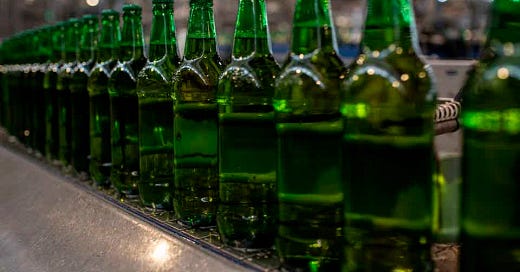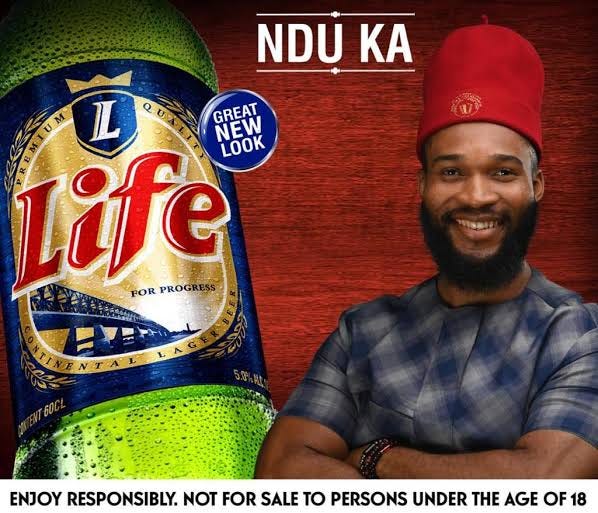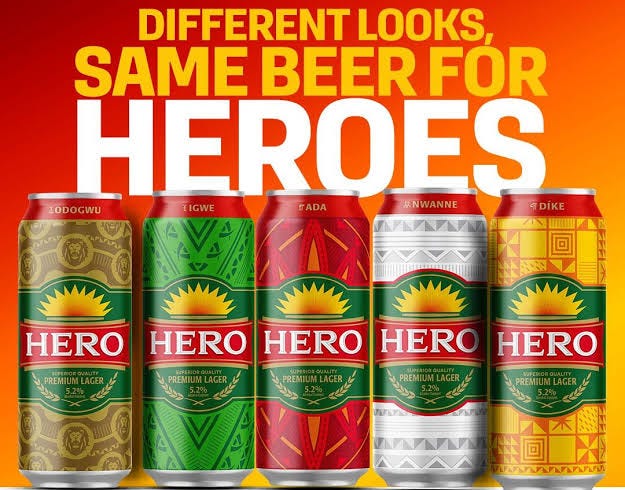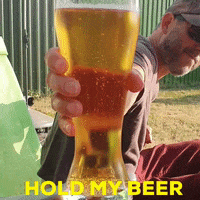‘Beer Me Witness’: Who Benefits From Drinking In Nigeria?
AFP
When legendary Nigerian actor, Pete Edochie and his son, Yul Edochie featured on the Life Continental Lager Beer advert, that was an indication of a life well-lived by two generations. Turu Ugo Lota indeed brought the glory home, as it means in English, and it tells the beauty, sheer desire to be successful against all odds and the potentials for greatness of a people.
The Igbo culture is rich, and it takes its spectacle from sharing drinks. It's the joy of meetings and the first item in parties. A drink is more than a drink. It's a cultural reflection of a people and it tells the tales of generations gone and will tell of those unborn.
Nigerian lager companies have found a great path in making beer brands a statement of a people. The South-East is the newfound spot for their competition and the people love all they bring. It could be Hero or Life, but the Igbo love having those options telling their minds and projecting their desires.
Check the rising sun on a can of Hero Lager, it’s as golden as the culture. It wears the people’s hearts on its emblem and is a wise way to preach unity and love to that group.
On Life Lager’s logo is the Second Niger Bridge, and a clear indication of where the thinking is directed.
South East Nigeria: Where A Brewer Loves
In February 2011, London-based beer company SAB Miller Plc (now part of Anheuser-Busch InBev) invested an initial $100 million to build a brewery in Onitsha, the economic epicentre and commercial hub of Anambra State. It was a statement of intent which led to the rise of many others.
The Nigerian lager industry has a wide room for competition but there are power players, and those who can always bring the people closer to what they seek. It is an oligopoly highly influenced by Heineken’s Nigerian Breweries. It has written and rewritten a drinking culture in Nigeria for 76 years and has at every turn brought new ideas on, in the form of products.
Currently, Nigerian Breweries holds close to 40% of the market share in the industry and International Breweries (owned by Ab InBev) comes closely behind it. Guinness (owned by Diageo) is third on the list. Heineken has a great influence on the oligopoly the Nigerian beer industry is, and every move they seem to make is a result of the fierce competition provided by the other two beer makers.
In 2021, the Dutch company acquired 84.7% of the ownership of Akwa Ibom-based Champion Breweries. It wasn't just a statement of bravado that it is still the biggest in the country, it clearly stated that others must up their game to meet Heineken. The Nigerian beer industry is an enormous market and it’s almost devoid of the goings-on in the country. Drinking is seen as a way to cast sadness off for most people and in other situations, it's for merry making.
International Breweries as a fierce competition produces more than 5.7 million hectoliters. Some of the best-enjoyed alcoholic beverages in Nigeria today are produced by the company including Budweiser and Hero Lager. Where the fierce battle for place remains is in the capacity of each company to capture an entire region. Industry players say this is not entirely possible as they all have excellent products for the public.
Credit: AFP
Heineken has the Nigerian beer industry on lock as it also contends with International Breweries Plc (IBPLC) owner AB InBev on the global stage. AB InBev holds the world market with more then 400 beer brands on its list and it sees the South-East as a battleground to attain the Nigerian crown.
Nigeria's alcoholic beverage sector is an increasingly lucrative industry and the introduction of new products is a step to swoop attention and consumption models to a company’s part. Life Lager for example, is a move by the Nigerian Breweries to provide stiff competition for the rapidly growing Hero Lager in the South East. More than a commercial battle, it highlights those companies’ desire to be at the centre of the people’s cultures.
The Niger Delta also has a very big stake in Nigeria’s beer industry and accounts for at least 30% of beer consumption in the country. Nigerians drink more than 12 litres of beer every year.
Hold My Beer, Spirits Say
Nigerians love alcohol. About a quarter of a trillion naira is spent on it every year. The local alcohol in rural communities brings people together. In urban centres, it’s the reason many are buddies today. The Niger Delta’s consumption of alcohol is in the tune of almost N75bn every year. For a country constantly held by its economic downturn, that's instructive. Regardless of the situation, people will drink.
In the last few years, spirits and bitters are proving strong competitors for beer. Many see them as a cheaper substitute, especially as they come in sachets and smaller containers. Most of them hardly refined. It's not out of place to see “Erujeje” or “Striker” in Nigeria today. The names are just as strong as their acceptance.
Young Nigerians, who make up 60% of the population love spirits while the elderly population are beer lovers. Both generations meet in the middle. Many adults see spirits as a fast way to terminal diseases and are downright scared of those consequences. For the youths, it’s what gives life to the party. While spirits give spirit to parties, bitters are the miracle workers for a maximum sexual romp. It's an engrained belief.
Despite the new desire for spirits in Nigeria, with consumption more than doubling in the last few years, the big breweries still control proceedings. They're now moving into the land of the spirits to have a hand on the cake making its way out of there.
The Underside Of A Rich, Timeless Culture
Many Nigerians have drinking problems. It's the solace for so many locals, yet an increase in drinking has also led to increased domestic abuse and assault.
According to a 2019 research, alcohol is the sixth leading risk factor contributing to most death and disability in Nigeria. Terminal diseases like liver cirrhosis is also greatly influenced by a bad drinking culture, and it has led to many road traffic accidents.
Alcohol consumption is timeless in Nigeria and it is the reason companies like Nigerian Breweries and others will not stop growing in the country soon. However, many Nigerians hardly listen to the simple message of “drink or enjoy responsibly”. Rather, heavy drinking is seen as a statement of strength amongst some groups. People drink an entire crate of beer, and use that as proof of excellence in alcohol consumption.
Control is important, but it negates the financial expectations of many companies, who thrive on the units of their products taken. So, to what degree is the message of responsible drinking a well-intentioned advice from companies? It's down to the consumer and his yearning and it looks uncontrollable. The companies gain, the country gains, the people merry, but the dangers are not unknown.







